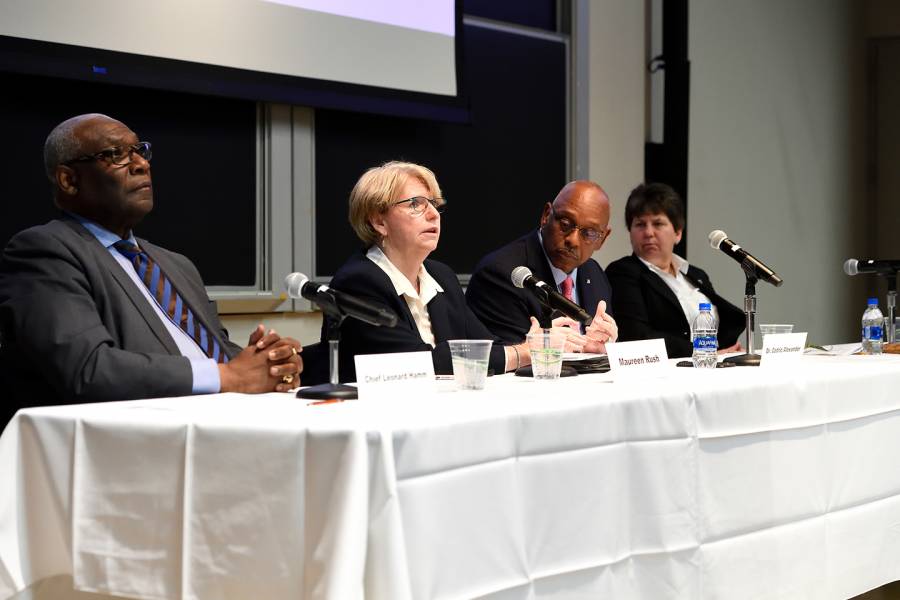Johns Hopkins University kicked off a multipart discussion series titled The Challenges of 21st Century Policing on Monday evening, welcoming a panel of national experts to discuss the current landscape of university policing.
The series—along with two open forums with university leaders and meetings with university and community organizations—is part of an ongoing effort to engage with students, faculty, staff, and neighbors as Hopkins considers options to augment its security operations.
In his opening remarks Monday, JHU President Ronald J. Daniels said the discussion series was developed in response to feedback requesting more opportunities for students, faculty, staff, and neighbors to take part in conversations about safety concerns on the university's Baltimore campuses and in neighboring communities.
Daniels added that while the establishment of a campus police department at Johns Hopkins—a possibility first raised publicly in March—remains an option, university leadership is open to alternatives and wants to learn from the experiences of other universities in similar settings that have confronted similar security issues.
"If there are other ways that we can get to where we need to, in terms of ensuring the level of safety and security for our campuses and the communities around us, we are all ears," Daniels said. "And these kinds of discussions will leave us ample opportunity to pursue the alternatives."
The conversation—which took place at the Bloomberg Center for Physics and Astronomy on JHU's Homewood campus—was moderated by Lawrence Jackson, a Bloomberg Distinguished Professor of English and History at JHU who noted that he has both personal and philosophical misgivings about the creation of a university police department at Hopkins.
"I'm worried that what a private police force amounts to is along the same lines as Hopkins manning a toll on portions of its city streets, or owning its own water and air," Jackson said. "I think that parts of the city and public life must be shared for the health of all, and justice and even injustice is also a part of that sharing."
Jackson asked the panelists how university police departments avoid racial profiling.
Sue Riseling, who served as chief of police at the University of Wisconsin-Madison from 1991 to 2016 and is now executive director of the International Association of Campus Law Enforcement Administrators, said that frequent bias training and officer reviews, as well as structures that ensure transparency and accountability, help reduce racial profiling.
"It's important to have the leadership, and it's important to have the organizational values [that prevent racial profiling]," Riseling said. "But you also have to put systems in place that can be used over and over and over again to see what, if any, issues there are. And if there are [problems with racial profiling], you root those issues out."
Attendees raised questions about how a university police department would be staffed; how it would be held accountable, and by who; and how the presence of a police department would affect life on campus, among other issues.
The answers to those questions, the panelists agreed, are embedded in the principles of 21st Century Policing, a concept developed by the Obama administration in response to the fatal shooting of Michael Brown by a police officer in Ferguson, Missouri, in 2014.
Panelist Cedric Alexander, deputy mayor of Rochester, New York, and a member of the task force that developed those principles, noted that the first pillar of 21st Century Policing is establishing trust and legitimacy within the community. A police department at Johns Hopkins should regard itself as guardians of the community rather than as an adversary.
"We all deserve a police department that is going to be fair, that truly believes in justice," Alexander said.
Added Leonard Hamm, director of public safety at Baltimore's Coppin State University and former commissioner of the Baltimore Police Department: "To me, 21st Century Policing is all about building positive relationships. … Rules without relationships equal rebellion."
Drawing on their wealth of experiences in university and community policing, the four panelists noted that any successful university police department must integrate and build relationships with the campus community to protect and serve its constituents. They added that this is a moment of opportunity for Johns Hopkins to create a safety and security structure that reflects the values and mission of the university.
"Building your own community police department, making [it] a part of the fabric of your university community, and having a voice in how you want that to look is where you're at right now," said Maureen Rush, vice president for public safety and superintendent of the Penn Police Department at the University of Pennsylvania. "And it's a wonderful opportunity. … It's not the police department, it's your police department."
The next discussion will focus on constitutional policing and police accountability and will take place on Nov. 9 from 11 a.m. to 1 p.m. at The Johns Hopkins Hospital's Hurd Hall. Daniel Webster, professor of health policy and management at the Johns Hopkins Bloomberg School of Public Health, will moderate the discussion.
Panelists will include:
- Vesla Weaver, Bloomberg Distinguished Associate Professor of Political Science and Sociology at Johns Hopkins University and a 2016-2017 Andrew Carnegie Fellow
- Christy Lopez, distinguished visitor from practice at Georgetown Law School and former deputy chief in the Special Litigation Section of the Civil Rights Division at the U.S. Department of Justice
- Nancy La Vigne, vice president for justice policy at the Urban Institute
Lunch will be provided at the event beginning at 11 a.m., and the discussion will begin at 11:30 a.m. Anyone who plans to attend is encouraged to RSVP online in advance. Information about shuttle transportation from the Homewood campus to East Baltimore is available on the Transportation Services website.
A subsequent discussion series event on the root causes of crime is also planned for later in the fall semester. Each event in the series will be free and open to the public, recorded, and livestreamed.
Additionally, two open forums at which students, faculty, staff, and community members will have an opportunity to speak directly to university leadership are planned in November—on Nov. 13 in Charles Village and on Nov. 26 in East Baltimore.
More information about upcoming events can be found on the university's Public Safety Initiatives website.
Posted in University News
Tagged campus safety and security









